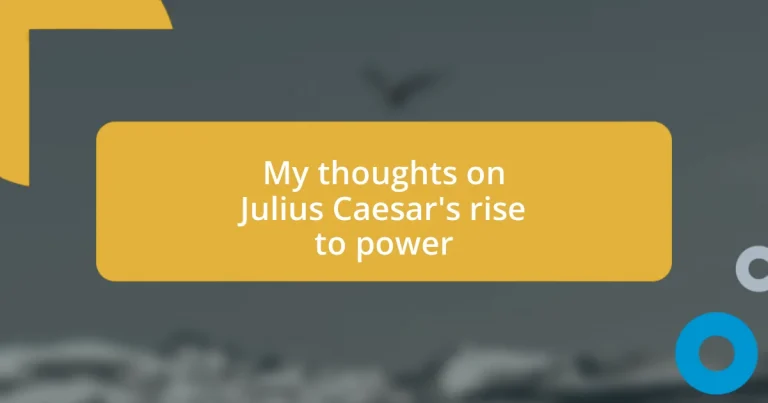Key takeaways:
- Caesar’s early life challenges, including financial difficulties and military experiences, fueled his ambition and honed his leadership skills.
- His military campaigns in Gaul showcased strategic brilliance through tactics like divide and conquer and innovative siege methods, notably at Alesia.
- Strategic alliances, such as the First Triumvirate with Pompey and Crassus, shaped his power, but rivalries and personal ambitions eventually led to civil war and conflict with Pompey.

Understanding Julius Caesar’s background
Julius Caesar was born into a patrician family in 100 BC, which placed him within the Roman elite, but his childhood wasn’t without challenges. Imagine growing up knowing that your lineage is expected to carry the weight of tradition while navigating the complexities of Roman politics. This tension likely fueled Caesar’s ambition, as he sought to forge a path that would not only honor his family’s legacy but redefine it.
As a young man, Caesar faced financial difficulties, a remarkable contrast to the wealth often associated with his social class. It’s intriguing to think how this experience would have shaped his desire for power. I remember a time in my life when I had to navigate obstacles that felt overwhelming; in many ways, Caesar’s early struggles may have ignited a fire within him—a burning determination to rise above his circumstances.
Moreover, his experiences in military campaigns, particularly during the Social War, honed his leadership skills and strategic mind. Isn’t it fascinating how adversity often serves as a crucible for greatness? Caesar’s early military prowess laid the groundwork for his later successes, transforming him from a reluctant politician into one of the most formidable military leaders of his time.

Caesar’s military achievements and strategies
During his rise to power, Caesar showcased extraordinary military achievements that were pivotal in shaping his legacy. His campaigns in Gaul, which lasted from 58 to 50 BC, exemplify his strategic brilliance and audacity. I can’t help but admire how he combined tactical innovation with an understanding of his enemies. For instance, his ability to engineer rapid troop movements and utilize local geography gave him an advantage that often left his opponents stunned.
Here are some key strategies and achievements that stand out in Caesar’s military career:
- Divide and conquer tactics: He effectively exploited the divisions among various Gallic tribes, ensuring that he fought them one at a time.
- The Siege of Alesia (52 BC): This brilliant encirclement tactic forced a larger Gallic army to surrender despite being vastly outnumbered.
- Use of fortifications: Caesar quickly constructed defenses during campaigns, allowing him to protect his troops and secure strategic locations.
- Adaptation and intelligence: He constantly gathered intelligence on enemy movements, which aided his quick decision-making on the battlefield.
Reflecting on his audacity, it resonates with my own experiences when I’ve had to make quick decisions under pressure. Just as Caesar did, there are moments when seizing opportunities swiftly can lead to monumental changes in the course of events. His relentless drive and tactical acumen are silent reminders of how courage and intellect can intertwine powerfully in the face of adversity.

Influential alliances and rivalries
Caesar’s rise to power was significantly shaped by his strategic alliances. Forming the First Triumvirate with Pompey and Crassus was a game-changer. This coalition provided him with critical resources and military support, allowing him to navigate the turbulent waters of Roman politics personally. I find it fascinating how these partnerships create a ripple effect—something I experienced when working on a team project where collaboration was key to success. Did you ever think about how these alliances could shift the balance of power? For Caesar, they certainly did, granting him unprecedented influence in a city rife with rivalry.
However, not all alliances were beneficial. The bond with Pompey soured over time, leading to a fierce rivalry that would define the latter half of Caesar’s career. It’s remarkable how friendship can devolve into enmity, echoing my own experiences where misunderstandings created chasms in relationships. The personal ambitions and public personas of both men clashed, ultimately culminating in civil war. Have you ever had to face a turning point where your alliances shifted due to conflicting interests? This intensity in Caesar’s life illustrates how fragile alliances can be, especially when personal ambitions are at play.
Moreover, Caesar didn’t shy away from utilizing rivalries to his advantage. He adeptly manipulated the political landscape by playing factions against each other. For instance, his opposition to the optimates, a conservative faction, allowed him to appeal to the populares, gaining popular support while undermining his rivals. I often reflect on moments in my life when I had to navigate competitive environments; leveraging my strengths while keeping tabs on rivals can be the difference between success and failure. This aspect of Caesar’s strategy resonates deeply with me—he exemplified how to turn adversities into opportunities by understanding the intricate web of relationships around him.














